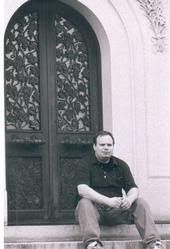Aw, fuck it.
From the very beginning of this project I debated including mummy films; with the exception of 1981's DAWN OF THE MUMMY, which explicitly tried to ape the wave of Italian zombie movies, cinematic mummies had their own individual set of rules, their own style. They really were their own separate entity, and to review them felt a bit like cheating.
Ultimately I decided, what the hell. They were, after all, human beings who had died and returned to life, which has always been my basic criteria--and God knows I've made exceptions for far less-deserving movies (for the record, I'm rather embarrassed about having HELLO AGAIN here, if only because it's an admission I've watched it). Besides, I've always had a soft spot for the ol' bandaged guys, who've appeared in some noteworthy movies I'd like to discuss,and I doubt there's enough to devote an entirely different blog to them. That, and BLACK VOODOO EXORCIST had already sneaked in.
Which it makes it somewhat ironic, then, that Universal's original THE MUMMY is not only more of a love story (albeit one with supernatural trappings) than a horror film, but that it parallels Tod Browning's DRACULA to such a degree it's almost a remake.
Proving that Hollywood's formulaic nature is nothing new, Universal hired DRACULA screenwriter John Balderston and cinematographer Karl Freund to direct in hopes of capturing the same box-office returns. In what may possibly simply unimaginativeness on Balderston's part, his script (originally to be based on the infamous French charlatan Cagliostro, who claimed to have been reincarnated multiple times, then transferred to Egypt to cash in on the public's fascination with the recently-unearthed Tutankhamen) follows DRACULA's in almost every regard: both films deal with outside forces (read: foreigners) bringing death and misery, and the fear of such forces taking off with proper young ladies (leave it to David Manners, as both DRACULA's Jonathan Harker and THE MUMMY's Frank Whemple, to be the refined gentleman who saves them from such a fate). Even Edward Van Sloan reprises his role of Van Helsing here as Dr. Muller, an occult expert and cock-blocker of the supernatural.
While the film is undoubtedly a classic, I found it to be one of the less frightening entries in the Universal monster cannon; the only truly scary moments are, rather unfortunately, in the prologue as Karloff awakens and takes his first tentative steps out of his casket. (Freund even echoes his former boss Browning in this sequence which, like DRACULA, uses no music, or sound whatsoever, letting the subtle opening of Karloff's eyes, the slow movement of his limbs, to create tension.) However, once Im-Ho-Tep ditches the bandages for his rendezvous with the exotic Zita Johann, the movie switches from fright-film to tragic romance.
There's lot to marvel over in THE MUMMY. Freund brings his same German Expressionism feel to the Egyptian desert, casting the same mood that helped make FRANKENSTEIN and DRACULA so renowned (a few shots during the flashback scene as a mummified Karloff is bring sent to his tomb recall similar moments in FRANKENSTEIN's graveyard scenes), employing much more fluid camera movement than he was able to do on those previous films. And whereas THE MUMMY features a climax much like DRACULA's, as Manners and Van Sloan rescue the girl from the monster's clutches, the former's final confrontation isn't as passive, but it does--rather progressively, I might add--relegate the males to the backseat of the action as Johann prevails over Karloff.
Just as they'd go on to do with the rest of their money-making monsters, Universal eventually sank THE MUMMY in Sequelville, producing a string of substandard follow-ups (which we'll review in turn in the days to come), none of which equaled the success of the original. As lackluster as they may be, they at least never featured an over-acting Brendan Fraser, making them much more palatable than the 1999 version.
Friday, May 16, 2008
Subscribe to:
Post Comments (Atom)

No comments:
Post a Comment